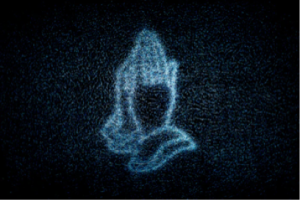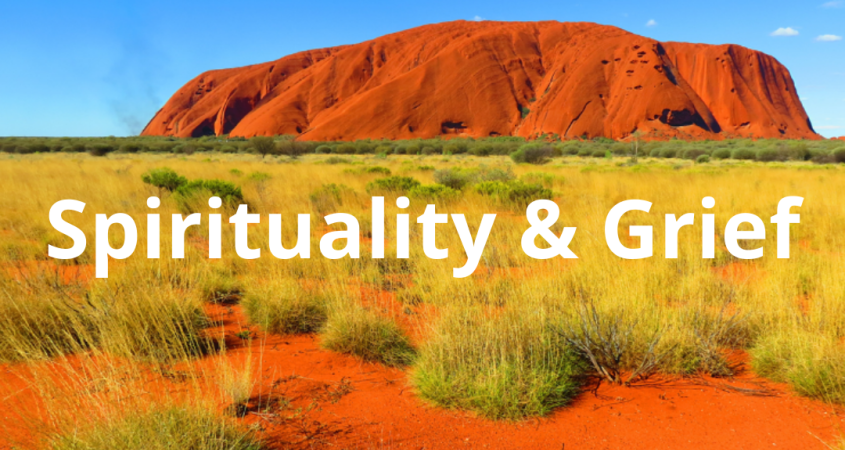Spirituality & Grief
Writing about spirituality and grief is complex but important.
Grief affects every part of our being – body, mind and spirit – especially in the first year or two when grief is new and raw, and we have not yet learned how to live full lives in the absence of someone or something central to our identity and sense of well-being.
Physically, we may experience everything from heartache, exhaustion and difficulty breathing, to aches in every part of our body. Mentally, making decisions and absorbing or retaining information may be difficult. Some folk overthink everything while others have difficulty thinking at all.
Trust in life, and in our familiar belief system may have been challenged, and we may feel a kind of disconnection to ourselves, to others, and to life itself. The sensation is a bit like being adrift in stormy seas with no sense of direction, struggling to locate a life raft.
How does spirituality fit into the chaos of grief? And what do we mean by the word ‘spirituality’?
Spirituality
The word spirituality is frequently associated with religion, but it has many definitions and in its broad sense, can be attributed to atheists and agnostics as appropriately as to people with religious affiliations.
In a previous Blog about the death of a soul-mate, I differentiated between souls (meaning living beings on earth, and in the sky and sea) and spirit – the essence or life force that leaves the body at the moment of death. Would we describe that essence, or life force, as ‘spirituality’, present in equal measure in all human life? Probably not.
 “Spirituality is the broad concept of a belief in something beyond the self. It may involve religious traditions centreing on belief in a higher power, but it can also involve a holistic belief in an individual connection to others and to the world as a whole.” (Elizabeth Scott)
“Spirituality is the broad concept of a belief in something beyond the self. It may involve religious traditions centreing on belief in a higher power, but it can also involve a holistic belief in an individual connection to others and to the world as a whole.” (Elizabeth Scott)
To me, spirituality involves much more than dutifully following the tenets and practices of a particular religion or philosophy. People can be nominal followers or evangelists of any belief system, without conveying the kind of spirituality I’m referring to.
Spirituality, as I understand it, involves a heart and mind connection in its deepest sense. Spirituality involves willingness, and ability, to connect with the best aspects of ourselves, to experience awe and wonder, and to connect with all living things.
It involves the capacity to join others in the circle of their experience, prepared to slow down long enough to symbolically ‘walk in their shoes’ so that our empathy comes from a place of true understanding.
If we are able to suspend judgement in specific situations until we have the full picture, our responsive actions are more likely to be humanely appropriate, a combination of ‘head and heart’ that could be described as spiritual.
Would we describe ourselves as spiritual and would others use that word to describe us? How do we recognise spirituality in others, and what criteria would we use?
As I sit here at my computer asking myself that question, I’m mentally writing a check list, aware that even using the term ‘check list’ doesn’t sound very spiritual. Is spirituality something we sense but can’t really articulate? I keep to-ing and fro-ing, then come back to the check list. I’m doing this because I remember times when people have described a mutual acquaintance as ‘such a spiritual person’, and my internal reaction has been ‘not by my criteria’. Outwardly I’ve asked the question ‘what is it about X that makes you say that?’
I obviously have a criteria, so in the pursuit of honesty and transparency, I’ll share it with you. On paper, it might read as someone who:
* honours truth
* respects the rights of others
* appreciates nature and is respectful of the environment
* is compassionate and carries out acts of kindness
* is self aware – knows their own strengths and weaknesses
* listens and really hears
* is patient and usually other centred
* is capable of postponing judgement until they have the big picture
* is self confident yet appropriately humble
* is receptive to, and appreciative of, kindness, compliments, and different perspectives
* experiences all emotions and expresses them appropriately
* is animated, and experiences awe and wonder
* can be enriched by periods of silence
* is curious and open to genuine enquiry and learning
* uses their intelligence and skills to the best of their ability
* cares about the greater good
* is prepared to fight for justice and defend those who are powerless or disenfranchised
* is generous and prepared to share knowledge, skills and worldly goods
Is this list achievable? I believe it is. Can I tick many of those qualities about myself? And what of your list, and your ticks?
As I read through my check-list again, I think of many people I know, or have known in my lifetime, for whom I would tick every point. They’re not saints, just ordinary, fallible human beings, who strive to be the best they are capable of and who do their utmost to help others achieve their best.
Spirituality is not a commodity that can be bought, sold, or controlled by others; it is not the province of any race, religion, occupation, or section of society – anyone – people with the lowliest social positions, can be more spiritual than those with the most wealth, fame, power or status.
I’ve experienced those qualities in family members, colleagues, friends and neighbours. I’ve seen parents of young children demonstrating those qualities, and have personally experienced those qualities in teachers. We’ve probably all witnessed those qualities being demonstrated by people involved in health care, and in heroic rescuers in times of crisis – in floods, fires, earthquakes, pandemics, and many other emergency situations. Some politicians begin their political careers with those altruistic goals in mind, but often fail to sustain their intentions when faced with the reality of their roles.
As I write, I’m also aware that at a personal level, it’s much easier for most of us to think, feel and demonstrate altruism in the good times than it is when life is difficult. For example, if we are experiencing unrelenting physical pain, debilitating frailty, constant nausea, or the anguish of mental illness, we all, understandably, become self focused. Our energy, scarce as it might be, is used up in the struggle to survive.
 The same thing happens when we grieve. When someone we love dies, or we lose something essential to our sense of identity, our focus may turn inwards, an instinctive act of self-preservation. Feeling unsafe, we may find ourselves floundering in unfamiliar territory, longing for clear directions to help us navigate the path ahead.
The same thing happens when we grieve. When someone we love dies, or we lose something essential to our sense of identity, our focus may turn inwards, an instinctive act of self-preservation. Feeling unsafe, we may find ourselves floundering in unfamiliar territory, longing for clear directions to help us navigate the path ahead.
What helps? Does faith in our previously held belief system prove resilient enough to be a life raft now, when desperately needed, or are our beliefs challenged? What happens to our spirituality when we are turned inwards, and unable, or unwilling to turn outwards, when turning outwards means having to confront the changed world we find ourselves in? Is our previously strong cord of connection to others, to beliefs, and to life itself, temporarily frayed, or frayed beyond repair?
Mending Frayed Connections
 We begin life in this world by breaking a connection that has literally been our lifeline – the umbilical cord. From our first breath we have a history of starting over, of breaking a connection that has served its purpose so that we can form new connections appropriate to the world in which we now find ourselves.
We begin life in this world by breaking a connection that has literally been our lifeline – the umbilical cord. From our first breath we have a history of starting over, of breaking a connection that has served its purpose so that we can form new connections appropriate to the world in which we now find ourselves.
When death breaks tangible, reciprocal connections with people we love, we struggle for a long time to learn how to live with their physical absence. Surviving on a day-to-day basis becomes a challenge, and there are many secondary losses to grapple with. Grief – a force to be reckoned with – can fray connections with so many important aspects of our lives – our confident, competent selves, some friendships, hope, excitement, beliefs and assumptions that gave our life meaning and purpose, and perhaps our trust in life itself.
The pain of grief is a universal experience, but the way we respond varies from person to person. Some folk feel as if they are wandering in a spiritual desert, numb, and incapable of thought or feeling. Others, no matter what life throws at them, seem able to sustain unwavering faith in a treasured belief system. But, no matter where we sit on the spiritual spectrum, there will be moments of doubt, moments of bleakness, momentary loss of hope as we are overwhelmed by surges of grief, and frayed connections that need TLC.
How do we pick up threads and mend what has frayed? How do we restore connection to our ‘essence’, our spirituality?
I’ll talk about things I have found helpful, knowing, as always, that what is right for me may be wrong for you. We each have to find our own entry point for the path ahead.
Prayer
 I think most people pray, in one way or another. Kahlil Gibran says what is prayer but the expansion of yourself into the living ether?
I think most people pray, in one way or another. Kahlil Gibran says what is prayer but the expansion of yourself into the living ether?
The process of expansion he refers to might be stimulated by using prayer beads, by chanting, by meditating, by kneeling like Christopher Robin at the foot of our bed, by listening to music, by being part of a like minded group, by sitting near water, walking in a forest, swimming, exercising, gardening, watching DVD’s about nature, or by feeling the sun gently warm our skin.
Gibran goes on to say I cannot teach you the prayer of the seas and the forests and the mountains. But you who are born of the mountains and the forests and the seas can find their prayer in your heart.
Holding a newborn baby, or a small animal is an instant stimulus for many of us, as is the gentle, non-demanding touch of someone we trust.
Experiencing Awe and Wonder
 Spirituality is the part of ourselves that responds positively to feeling small, to being awed by things greater than ourselves. For example, I remember the feeling I experienced when walking in a redwood forest in the US, my eyes travelling up the enormous trunks of trees that had lived for eons, excited when I eventually saw small patches of blue shining through the leaves. I felt very small.
Spirituality is the part of ourselves that responds positively to feeling small, to being awed by things greater than ourselves. For example, I remember the feeling I experienced when walking in a redwood forest in the US, my eyes travelling up the enormous trunks of trees that had lived for eons, excited when I eventually saw small patches of blue shining through the leaves. I felt very small.
 Another awe inspiring moment was an unforgettable experience in New Zealand. Travelling with my husband, daughter and grandchildren along a country road in the late afternoon, we suddenly let out a collective gasp. Both sides of the road were lined with leafless trees, long icicles hanging from every branch and every twig. The sun lit the icicles so that we were almost blinded by this magical light, as if we had somehow stumbled into fairyland. We stayed as long as possible, reluctant to end the experience, and were delighted next morning to see a photo of that scene on the front page of the local newspaper. Someone else had experienced and appreciated the awe and wonder that we felt.
Another awe inspiring moment was an unforgettable experience in New Zealand. Travelling with my husband, daughter and grandchildren along a country road in the late afternoon, we suddenly let out a collective gasp. Both sides of the road were lined with leafless trees, long icicles hanging from every branch and every twig. The sun lit the icicles so that we were almost blinded by this magical light, as if we had somehow stumbled into fairyland. We stayed as long as possible, reluctant to end the experience, and were delighted next morning to see a photo of that scene on the front page of the local newspaper. Someone else had experienced and appreciated the awe and wonder that we felt.
I felt awe and wonder when my children were born, my grandchildren, and later, my great grandchildren. I feel awe and wonder when I look at snow clad mountains, at the beauty of sunrises and sunsets, as I watch the trees near my home swaying gently in the wind, when people say things that touch my heart, when people surprise me with deeds that demonstrate that they really know who I am, and care.
I have experienced many moments of awe and wonder in counselling sessions – when a client and I connect in a way that is beyond words – that is an expression of infinite trust.
When I have been in the depths of my own grief I have repaired frayed connections with life by watching the waves and listening to children playing on the beach, and by finding a quiet corner where I can appreciate stillness.
Asking for Help
In the darkest moments of my life I have practised what I preach and asked for help. Writing at those times was like a prayer – an expansion of myself into the living ether. The people I chose to confide in gave me what I needed – ears that really heard (or more accurately, heard in my written words), compassionate understanding, and wise counsel. Your friend is your needs answered. (Gibran)
I hope anyone reading these words has found, or will find, the help you need.
Knowing when we need help, asking for it, being receptive to it, and using it wisely is part of our spirituality.
Acting ‘As if’
Most of us are familiar with the saying fake it till you make it.
As glib as this saying might sound, it’s a truth in bereavement. When we are numb, or wracked with pain, it’s not easy to feel like being demonstratively loving or generous. Surely it’s our time to be looked after, to receive rather than give? We certainly need to receive care – it’s the ‘rather’ bit I’d change. Strangely, at a time when we are most needy, giving can be more restorative than receiving. When we choose to act ‘as if’ we are our former, giving selves, we begin the process of turning towards life, of kick-starting the spirituality at our core. Giving reminds us of who we are. To give to another brings a special feeling to oneself. That is why we continue to give. (P.J.R.)
A Time for Everything
There is a time to grieve and a time to heal, but that path isn’t a straight line – it’s all over the shop, both aspects intermingled. For the rest of our lives we will have moments in the spiritual desert, moments of doubt and confusion, moments without hope, interspersed with indications, small and intermittent at first, that we are ‘in life’ again – that we have re-found our spirituality.
 Like the first soft rays of the spring sun, the shy appearance of the first buds on naked trees, I feel the gentle stirring of life within me and know that I am whole again. (D.R.M.)
Like the first soft rays of the spring sun, the shy appearance of the first buds on naked trees, I feel the gentle stirring of life within me and know that I am whole again. (D.R.M.)
Gradually, we gather our memories around us and re-live significant moments until appreciation for what we have had fills some of our empty heart spaces. Memories, precious and enduring, become part of our ‘essence’, reminders in dark times that although people die, our relationships with them live forever. We are still connected.
Help
Help is always available – at ‘A Friend’s Place’ or by contacting our outreach service.
Dianne McKissock OAM
NCCG Outreach Support Service
Email support for dying and bereaved people and anyone involved in their care






